At Genacol, we care about our customers’ joint health and well-being. This is why we have been committed for more than 20 years to a quest for excellence driven by a strong desire for technical and scientific innovation.
Thanks to Genacol’s patented enzymatic hydrolysis technology, the AminoLock® Sequence Technology, we obtain ultra-hydrolyzed collagen from a bovine source: AminoLock® Collagen. This unique collagen peptide has the lowest molecular weight in the world at less than 1 kilodalton (kDa) and is specifically designed to reduce joint pain associated with osteoarthritis.
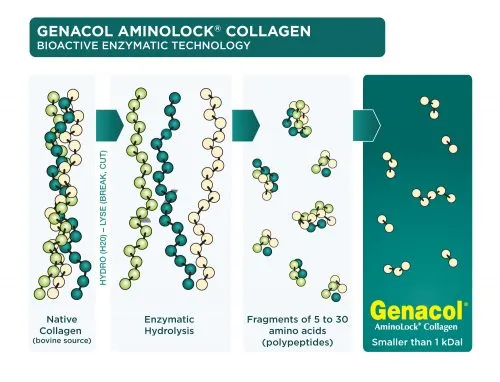
A scientific partnership was concluded in 2017 with the School of Human Nutrition at McGill University. Their innovative comparative research made it possible to evaluate and quantify the peptides of AminoLock® Collagen in comparison with a generic collagen hydrolyzate thanks to an analysis system simulating digestion.
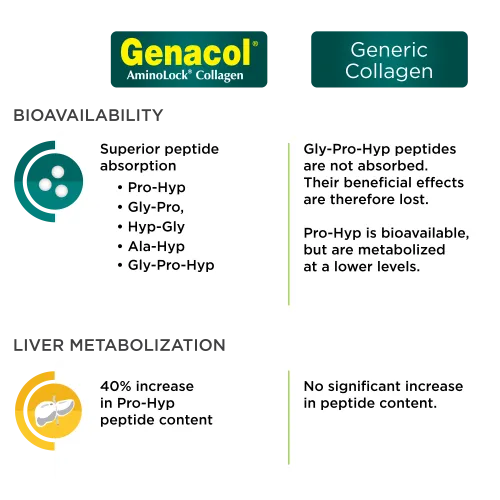
This collaborative research project with McGill University has demonstrated better bioavailability of AminoLock® Collagen. In addition, it showed that several peptides important for joint health are better absorbed and metabolized than generic collagen. These essential peptides provided by our proprietary ingredient have been measured, along with their known joint health benefits, confirming that Genacol® AminoLock® Collagen is indeed different and unique.
The scientific partnership with the team of Dr. Stan Kubow of the School of Human Nutrition at McGill University was concluded in 2017 and last 2 years. This collaborative research project made it possible to identify and quantify the bioavailability of certain key peptides after the complete process of digestion, absorption and metabolization between the AminoLock® from Genacol® and a generic hydrolyzed collagen supplement.
Dr. Kubow and his team have made certain observations:
The bioactive peptides Pro-Hyp, Gly-Pro, Hyp-Gly, and Ala-Hyp and Gly-Pro-Hyp from AminoLock® Collagen are absorbed and then transferred into the systemic circulation (first-pass metabolism);
Only the Gly-Pro-Hyp present in AminoLock® Collagen is absorbed and then transferred into the systemic circulation. The peptide Gly-Pro-Hyp from the generic product does not undergo the first-pass effect and is therefore not bioavailable and will not reach the joints, so the effects associated with this peptide chain are therefore lost);
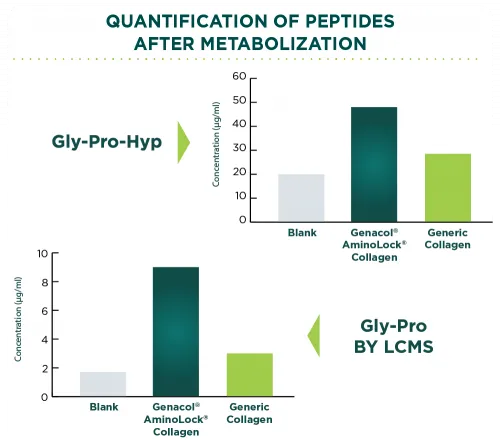
The peptides that reach the systemic circulation have significant permeability (absorption capacity). AminoLock® Collagen products also have better permeability of Gly-Pro-Hyp peptides compared with other collagen hydrolyzates from bovine sources and those from fish, which were compared;
Peptides are also metabolized by the liver before being released into the systemic circulation, but to different degrees depending on the product; Genacol® unique collagen hydrolyzate is better metabolized than the generic: changes in the composition of the peptide chains, as well as a significant increase (around 40%) in the contents of Pro-Hyp, are observed there, but not in the generic collagen.
These results confirm that Genacol’s AminoLock Collagen is indeed different and unique, has better bioavailability, offers better absorption, and provides the body with key bioactive peptides for joint health.

After six months of treatment, the results showed a significant increase in the proportion of patients reporting a notable reduction in joint pain when they consumed Genacol AminoLock® Collagen compared to patients on placebo.
The first study was a multicenter randomized placebo-controlled trial carried out in Belgium by world-renowned researchers in the field of osteoarthritis (10).
Patients suffered from joint pain in various areas: upper body (shoulder, elbow, wrist), lower back or lower body (hip, knee).
Over 140 patients were randomly assigned to receive either 1200 mg of Genacol® AminoLock® Collagen or a placebo. The study was well balanced (baseline patient characteristics) and of excellent quality. The authors used a visual analog scale (VAS), the Gold Standard reference test, for the subjective assessment of pain. The VAS scale is notably used to demonstrate the clinical efficacy of analgesic drugs. It is recognized by regulatory agencies such as the US Federal Drug Agency (FDA) and the Canadian Therapeutic Products Directorate (TPD).
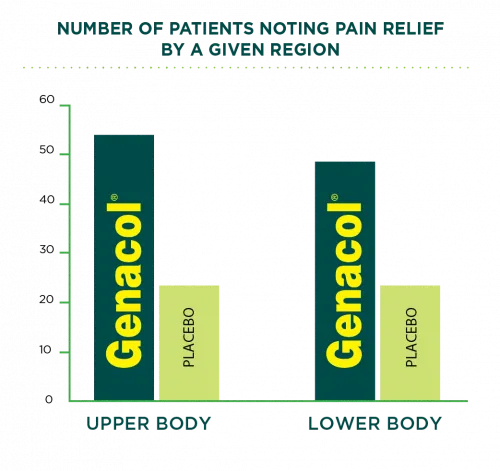
After six months of treatment, the clinical studies showed a significant increase in the proportion of responders (minimum 20% improvement in pain VAS score) compared to placebo.
This result is more significant if one considers that the study subjects suffered from pain in various joint areas. In contrast, most other trials concentrate on a particular joint (for example, the knee).
In fact, when results were segregated according to different body regions, treatment with Genacol’s AminoLock® Collagen was even more impressive. For instance, for the upper body (shoulder, elbow, wrist) and the lower back, twice as many patients taking Genacol® AminoLock® Collagen noted an improvement in joint pain instead of patients on placebo.
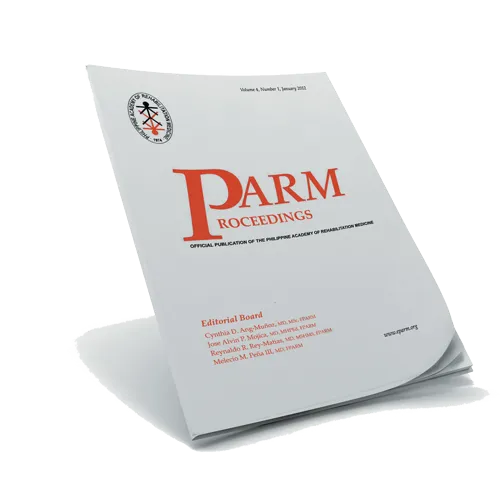
After six months of treatment, the results of this clinical study indicate that Genacol® AminoLock Collagen may not only reduce pain and improve knee function in patients with osteoarthritis but also prevent joint space degradation.
A second clinical study was carried out in a Veterans Hospital Center in the Philippines; this time, the study focused on patients suffering from knee osteoarthritis (12).
A total of 113 patients were randomly assigned to receive either a daily dose of 1200 mg of Genacol® AminoLock® Collagen or a daily dose of 200 mg of aceclofenac, a standard non-steroidal anti-inflammatory drug (NSAID).
The authors used the Western Ontario and MacMaster Universities Osteoarthritis Index (WOMAC). The latter is often considered the reference test for knee osteoarthritis since it assesses pain and joint function in several daily situations of rest and activity (13).
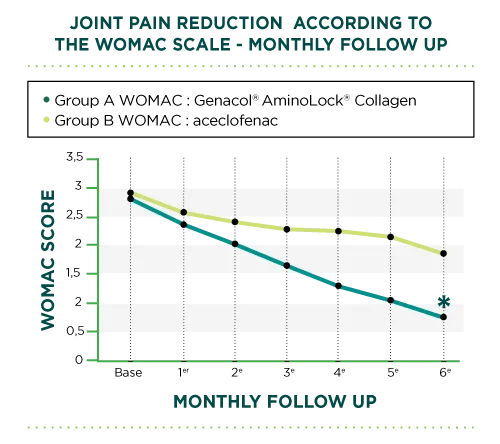
After six months of treatment, the WOMAC score of patients taking Genacol® AminoLock® Collagen was significantly reduced, whereas patients taking aceclofenac were not.
This clearly demonstrates that joint pain and function were considerably improved by the daily administration of Genacol® AminoLock® Collagen, an effect that was significantly superior to the reference NSAID drug.
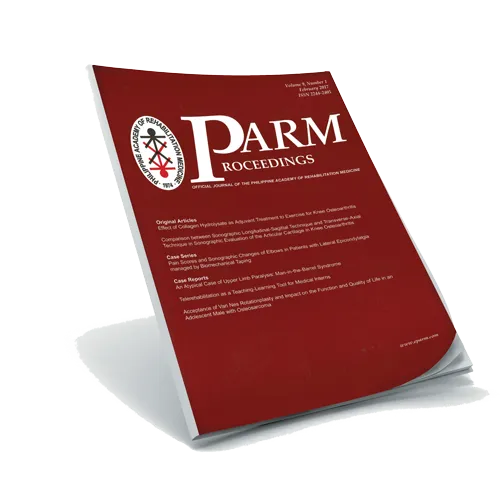
After 6 months of treatment, this clinical study showed that taking AminoLock Collagen combined with an exercise program reduced pain, improved general functional status and caused changes to intra-articular and periarticular structures compared to patients on placebo.
A third clinical study was developed at the University of Santo Tomas Hospital in the Philippines. The objective was to determine whether taking Genacol® AminoLock® Collagen, combined with a physical exercise program, shows a significant reduction of cartilage wear and tear.
In the study, participants were randomly selected. A treatment group took three 400 mg capsules of Genacol® Aminolock® Collagen daily for six months, and a control group (n=53) took a placebo. The two groups were subjected to a standard program.
Evaluations were carried out at the start and end of the six months. These evaluations included reviewing participants’ medical records, a physical exam, WOMAC evaluations and ultrasonography of both knees. Calculation of means and standard deviations were carried out for demographic information, visual analogue scale (VAS) pain evaluations, WOMAC evaluations and ultrasound measurements.
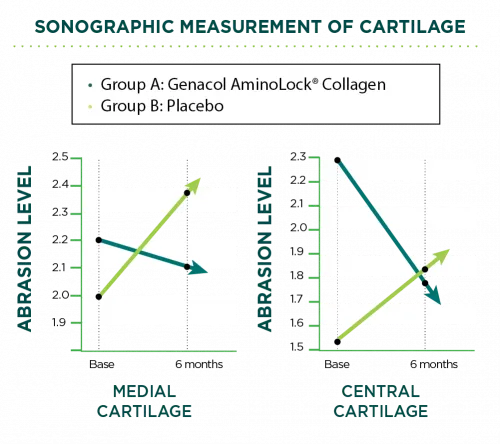
Results: in general, WOMAC and VAS evaluations decreased compared to the initial evaluations of both treatment groups. There was a significant increase of 62.5 % in the execution of the exercise program by the treatment group who took Genacol® Aminolock® Collagen.
The Genacol® AminoLock® Collagen group demonstrated a fairly significant change in the average level of cartilage wear compared to the placebo group. The result of central cartilage compared to the placebo group.
Conclusions: Our clinical team demonstrated that Genacol® Aminolock® Collagen, combined with an exercise program, reduced pain, improved general functional status and produced changes in the intra-articular and peri-articular structures (that is, an improvement in the level of wear of the cartilage and a decrease in the movement of the lateral meniscus of patients with osteoarthritis of the knee.
© All rights reserved. Genacol 2025

Please wait while you are redirected to the right page...